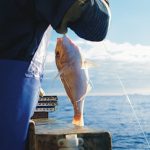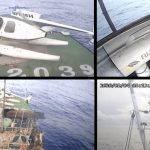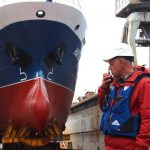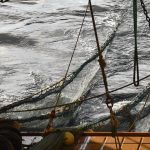Following his meeting with the White Fish Producers’ Association executive chairman Mike Park and vice chairman John Watt at the Scottish Parliament, Fisheries Secretary Richard Lochhead said:
“I am acutely aware that the tough restrictions imposed by the EU, combined with the global economic situation, are making life difficult for some of our fleets. They can rest assured that we will continue to do everything in our power to support them during these difficult times.
“Today’s helpful meeting was the first of many that I’ll be holding with the industry over the coming weeks as part of our commitment to find a way through this together. We are already looking to increase the number of buy back options under the Conservation Credits scheme and are ready to consider further suggestions as part of our consultation with skippers about what the long-term system for allocating effort should be.
“We have also given skippers the option of bringing forward 10 days from their allocation later in the year – to take the heat out of the market for days.
“The deal secured at December Council helped to avoid some distinctly unpalatable alternatives such as the closure of the lucrative west coast prawn fishery and having 25 per cent cuts in days at sea across the board. We are continuing to work with the industry to develop these measures, which are also having an impact on our European neighbours.
“Nonetheless we recognise that the industry’s difficulties are further compounded by the current economic crisis. This is hitting communities and industries hard across Scotland and the fishing industry is no different.
“As previously mentioned by the industry, my officials are meeting with Commission officials next week to underline that – while we are committed to cod recovery and have led the way in developing cod avoidance measures – the effect on the fleets is hard, particularly in the worsening economic climate.”
Mr Lochhead is holding talks in the coming days and weeks with representatives of the Scottish White Fish Producers’ Association, the Scottish Fishermen’s Organisation and the Western Isles Fishermen’s Association, among others.
Mr Lochhead will also attend the Scottish Conservation Credits Steering Group on April 15.
Last night Mr Lochhead met Flemish Minister President and Belgian Fisheries Minister Kris Peeters in Brussels to discuss the reform of the Common Fisheries Policy and the cod recovery plan. As Belgium will hold the Presidency of the EU Fisheries Council next year, Flanders will play a key role in shaping EU fisheries policy
Mr Lochhead said:
“We recognise the tough measures that Scotland’s fishing communities are facing right now and the effect that these are having on the industry. The EU’s outdated and broken Common Fisheries Policy, combined with the current economic situation, is having a dreadful impact on our fishing communities, and we have worked hard to offset the very worst of its impact.
“At December Council we helped secure a deal that allowed cuts in days at sea to be avoided if vessels adopt new conservation efforts. This helped to avoid some distinctly unpalatable alternatives such as the closure of the lucrative west coast prawn fishery and having 25 per cent cuts in days at sea across the board. We are working with the industry to develop these measures, which are also having an impact on our European neighbours.
“Nonetheless we recognise that the industry’s difficulties are further compounded by the current economic crisis. This is hitting communities and industries hard across Scotland and the fishing industry is no different.
“The fishing industry, like any other, deserves our help and support during these difficult and uncertain times. The EU, which has been taking emergency measures to tackle the economic downturn, needs to also take the problems facing our fishermen seriously.
“We need to work together to get through this and over the coming days and weeks I will be speaking to representatives of the fishing industry across Scotland. We must look at the best ways to overcome the problems that we all face and how we can work together.
“The EU needs to offer our fishermen a light at the end of the tunnel given the painful measures they are currently facing, which ironically are being imposed against a backdrop of the recovering North Sea Cod stock.”
The new EU cod recovery plan, agreed last year, includes targets to reduce substantially cod mortality caused by fishing. To achieve this, the European Commission proposed a 25 per cent reduction in days at sea for Scottish fishing vessels. The Scottish Government was able to secure a deal that allowed cuts in days at sea to be avoided if vessels adopted new conservation measures. The Government has been working with the industry to develop these measures, like the use of more selective fishing gears that allow more fish to escape.
As part of the new plan, EU Member States are now responsible for allocating days at sea to vessels. The Scottish Government launched a consultation with the fishing industry on this so that individual skippers could have their say on a new system affecting them:
The consultation paper asks skippers whether they would prefer days at sea to be allocated on a flat rate – the same allocation for each vessel of the same type – or on an historic basis, taking into account each vessel’s fishing in previous years. It closes on April 3.
The quota deals reached during the fisheries negotiations last year were:
33 per cent mackerel increase
30 per cent North Sea cod increase
8 per cent increase for west coast monkfish
5 per cent increase for west coast megrim
prawn fleet able to catch the same
haddock fleet able to catch the same as last year








